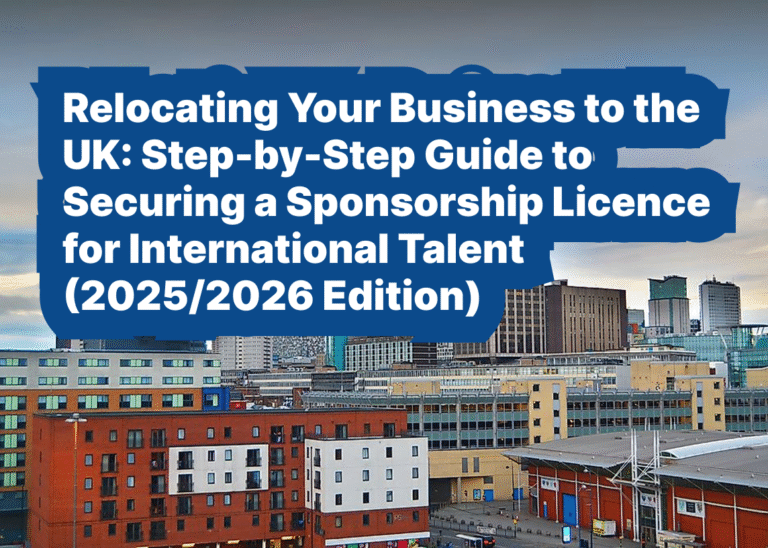The United Kingdom’s immigration landscape has undergone significant transformations in 2025, with sweeping changes to skilled worker visa sponsorship requirements that have reshaped how employers approach international recruitment. These modifications, which came into effect on July 22, 2025, represent some of the most substantial alterations to the UK’s skilled worker immigration system in recent years, fundamentally changing the criteria for sponsorship eligibility and creating new challenges and opportunities for both employers and prospective employees.
Understanding the 2025 Immigration Revolution
The changes introduced in 2025 mark a decisive shift towards prioritizing higher-skilled immigration while tightening controls on lower-skilled roles. From 22 July 2025, a job must normally be graded at Regulated Qualifications Framework (RQF) level 6 (roughly graduate level) to be sponsored under the Skilled Worker route. This represents a significant elevation from the previous RQF level 3 requirement, effectively raising the bar for skilled worker visa eligibility to graduate-level positions.
The rationale behind these changes stems from the government’s broader immigration strategy outlined in the 2025 Immigration White Paper, which aims to reduce overall migration numbers while ensuring that the UK continues to attract top-tier international talent. An initial reduction to the list of jobs eligible for Skilled Worker visa sponsorship took effect on 22 July 2025. This approach reflects a more selective immigration policy designed to balance economic needs with public concerns about migration levels.
Key Changes to Salary Thresholds and Requirements
One of the most immediate impacts of the 2025 reforms concerns salary thresholds, which have seen substantial increases across multiple visa categories. From 22 July 2025 the following minimum salary thresholds will apply: Skilled Worker – General minimum salary threshold – £41,700 (rising from £38,700) Global Business Mobility – General minimum salary threshold – £52,500 (rising from £48,500) These increases represent more than just inflationary adjustments; they signal a clear policy direction towards attracting higher-value workers.
The salary threshold changes are particularly significant when considering the broader context of UK wage levels and regional variations. For many employers, especially those outside London and the Southeast, meeting these new salary requirements may prove challenging, potentially limiting their ability to recruit international talent for certain positions. However, the government has maintained some flexibility through exceptions and alternative qualification routes that can help employers navigate these new requirements.
Additionally, Certificates of Sponsorship issued after 9 April 2025 now have a minimum salary threshold for Skilled Workers of £25,000 per year (£12.82 per hour). This is the absolute base general threshold and will apply to those extending their visas and new applicants. This creates a tiered system where different salary levels apply depending on the specific circumstances and timing of the application.
Impact on Specific Sectors and Occupations
The 2025 changes have created particular challenges for certain sectors that have historically relied on sponsored workers. The healthcare sector, particularly care services, faces significant disruption. Sponsorship as a care worker will not be possible for new entrants to the route from 22 July 2025, with the policy context stating “Concerns over workers sponsored as care workers and senior care workers (occupation codes 6135 and 6136) are well known.” This change reflects ongoing concerns about working conditions and potential exploitation in the care sector, but it also creates substantial recruitment challenges for care providers.
The elevation of skill requirements to RQF level 6 affects numerous occupations that were previously eligible for sponsorship. The skills threshold for eligible roles increased to RQF 6 (equivalent to graduate-level) from 22 July 2025, with limited transitional provisions in place. For skilled worker sponsorship, a job must now be classed at RQF level 6 or above. This means that many roles that were previously considered “skilled” under immigration law no longer qualify for sponsorship, forcing employers to either upskill positions or seek alternative recruitment strategies.
The Sponsor Licence Application Process in 2025
For employers seeking to sponsor skilled workers, obtaining a sponsor licence remains the first crucial step. The licence application process has been refined in 2025 to address some of the previous system’s inefficiencies while maintaining robust checks on employer suitability. Decide who will manage sponsorship within your business. Apply online and pay the fee. UK Visas and Immigration (UKVI) may visit your business to check it’s suitable. You’ll be given a licence rating if your application is successful.
The sponsor licence system operates on a rating basis, with employers receiving either an A-rating or B-rating depending on their compliance history and risk assessment. A-rated sponsors enjoy greater flexibility and fewer restrictions, while B-rated sponsors face additional monitoring and compliance requirements. The Home Office continues to conduct compliance visits and ongoing monitoring to ensure that sponsors meet their obligations throughout the licence period.
To obtain a skilled worker licence, you have to submit an application to the Home Office. Sponsor licence holders must also meet certain compliance duties when hiring and employing migrant workers. These compliance duties include maintaining accurate records, reporting changes in circumstances, and ensuring that sponsored workers comply with their visa conditions. Failure to meet these obligations can result in licence suspension or revocation, making compliance management a critical business function for sponsoring employers.
Financial Implications and Cost Considerations
The 2025 reforms have introduced new financial considerations that significantly impact the total cost of sponsoring skilled workers. Certificate of Sponsorship Fee: It is now prohibited to pass on the fee for a Certificate of Sponsorship assigned on or after December 31 2024. These prohibitions align with the existing rule against passing the Immigration Skills Charge to workers. This means employers must absorb these costs entirely, increasing the financial burden of international recruitment.
The prohibition on passing costs to workers represents a significant shift in the economic dynamics of skilled worker sponsorship. Previously, some employers were able to offset sponsorship costs by requiring workers to contribute to fees or charges. The new rules place the full financial responsibility on employers, which may influence recruitment decisions and budgeting for international talent acquisition.
Furthermore, The amount of the immigration skills charge will be increased (by 32%) as part of the changes expected to be implemented by the end of 2025. This substantial increase in the Immigration Skills Charge will add thousands of pounds to the cost of sponsoring each worker, particularly for longer-term sponsorship arrangements.
Streamlined Processes and Administrative Changes
Despite the increased restrictions and costs, the 2025 reforms have introduced some administrative efficiencies designed to streamline certain aspects of the sponsorship process. The requirement for sponsors to first try to recruit from the pool of Skilled Workers seeking new sponsorship is being removed. As a result of the above changes, all applications to which the requirement applied are being closed. This change eliminates a bureaucratic step that often delayed recruitment processes without demonstrable benefits for the domestic labour market.
The removal of this requirement reflects a more pragmatic approach to labour market testing, acknowledging that the requirement to advertise positions domestically often failed to produce suitable candidates for highly specialized roles. This streamlining should reduce administrative burdens and speed up recruitment processes for employers with urgent staffing needs.
Language Requirements and Enhanced Standards
The 2025 reforms also address language proficiency requirements, with The language requirements across the UK’s immigration system will be increased, this will apply to visa holders across various categories. These enhanced language requirements reflect the government’s emphasis on ensuring that skilled workers can integrate effectively into UK workplaces and contribute meaningfully to their professional environments.
Higher language requirements may present challenges for some international candidates, particularly those from non-English speaking countries. However, they also align with employer needs for workers who can communicate effectively in professional settings. Employers may need to factor language assessment and support into their recruitment and onboarding processes.
Strategic Planning for Employers
Given the scale of changes introduced in 2025, employers must adopt strategic approaches to international recruitment that account for the new regulatory landscape. This includes reassessing job roles and classifications to ensure they meet the elevated skill requirements, adjusting salary structures to comply with new thresholds, and implementing robust compliance management systems.
Employers should conduct comprehensive audits of their current sponsored workforce to identify any potential compliance issues and ensure ongoing adherence to sponsorship obligations. This is particularly important given the increased scrutiny and potential for licence sanctions under the new regime.
The changes also necessitate closer collaboration between HR departments, legal teams, and senior management to ensure that international recruitment strategies align with business objectives while meeting regulatory requirements. This may involve restructuring certain roles, investing in training and development to elevate skill levels, or exploring alternative recruitment channels for positions that no longer qualify for sponsorship.
Future Outlook and Continued Evolution
The 2025 changes represent just the beginning of what appears to be an ongoing evolution in UK immigration policy. The government has indicated that additional changes are under consideration, including potential modifications to settlement requirements and further adjustments to skill and salary thresholds. SK1.5, SK3.34: minor drafting amendment to reflect the qualifying period for settlement is likely to be increased (as set out in the Immigration White Paper)
Employers and immigration practitioners must remain vigilant for additional changes and be prepared to adapt their strategies accordingly. This dynamic regulatory environment requires ongoing monitoring of policy developments and proactive planning to mitigate potential disruptions to international recruitment programs.
Best Practices for Compliance and Success
To navigate the 2025 immigration rules successfully, employers should implement comprehensive compliance frameworks that go beyond minimum legal requirements. This includes establishing clear internal procedures for sponsor licence management, maintaining detailed records of all sponsored workers, and conducting regular reviews of sponsorship practices.
Effective compliance management also involves staying informed about regulatory developments, maintaining relationships with immigration specialists, and ensuring that all staff involved in international recruitment understand their responsibilities under the sponsorship regime. Regular training and updates are essential to prevent inadvertent compliance breaches that could jeopardize sponsor licence status.
Conclusion: Adapting to the New Reality
The 2025 UK immigration reforms represent a fundamental shift towards a more selective, higher-skilled immigration system. While these changes present challenges for employers accustomed to previous arrangements, they also create opportunities for organizations that can adapt effectively to the new requirements.
Success in this new environment requires strategic thinking, robust compliance management, and a clear understanding of how the changes affect specific industries and roles. Employers who invest in understanding and adapting to these changes will be better positioned to access international talent while maintaining compliance with the evolving regulatory framework.
The skilled worker visa system remains a valuable tool for accessing global talent, but the parameters for success have shifted significantly. Organizations that embrace these changes and develop sophisticated approaches to international recruitment will continue to benefit from the diverse skills and perspectives that international workers bring to the UK economy.
As the immigration landscape continues to evolve, staying informed and adaptable will be crucial for employers seeking to maintain effective international recruitment capabilities. The 2025 reforms mark a new chapter in UK immigration policy, one that demands greater sophistication and strategic planning from employers while maintaining the UK’s position as a destination for top international talent.






